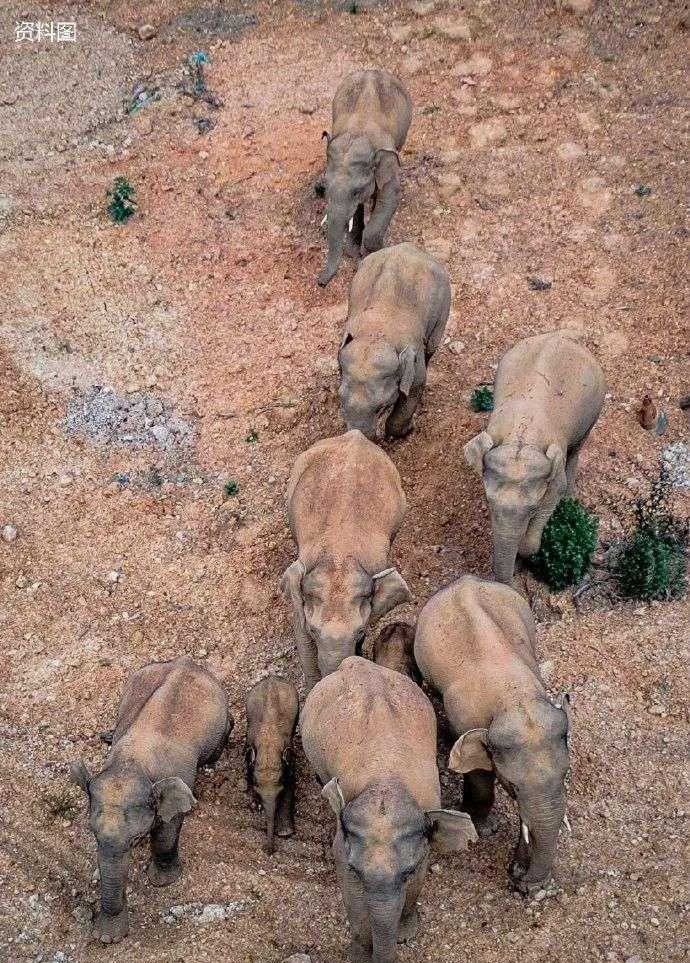The 15 elephants that went all the way north touched the hearts of many people in our country, and even many people woke up and would go to the Internet to search for "where are the elephants".

Although the elephant migration to the north is very abnormal, 4,000 years ago, most of China's territory has wild elephants, but now only parts of Yunnan and Southeast Asia and other parts of the wild Asian elephants exist.
Dr. Sun Quanhui, chief scientist of the World Society for the Protection of Animals, said in an interview that the departure of the 15 elephants from their original habitat is likely to be an active spread and an act of survival and evolution.
At the same time, Dr. Sun Quanhui also introduced that the elephants are less likely to return to their original habitat, and if there is no special method, they are likely not to return to their original habitat.
Since this is the case, netizens have proposed: "Since elephants are not willing to return to their original habitat, why not leave them in the local area, not only expand their habitat, but also increase local tourism revenue."
But you know what? This idea is very dangerous for elephants!
Nowadays, there are two genera and three species on the earth, one is a very large African elephant genus, and the other is a smaller Asian elephant genus, and the elephant that "ran away from home" this time is the Asian elephant.
Asian elephants are not as large as African elephants, but adult elephants weigh 3,000-5,000 kilograms. Coupled with the fact that elephants have very weak digestion capacity, only 40% of their food can be digested and utilized by them, and the remaining 60% will be excreted intact, which is why their demand for food is very large.
Because elephants have a very high demand for food, they also have very high food requirements in their habitats, and if the local forest cannot meet their food needs, they may leave the forest and come to human gathering places, destroying farmland and destroying crops.
Some experts believe that the reason why the 15 elephants "ran away from home" is likely to be related to the seasonal shortage of food in their habitat, in the season of food shortage, elephants often go out of the forest for migration, but rarely will go all the way north to Kunming like them.
Although Kunming also belongs to the south of China, Kunming is not suitable for the survival of elephants. According to Chen Mingyong, a professor at the School of Ecology and Environment of Yunnan University, from the distribution of Asian elephants in China, the altitude, annual average temperature and altitude after the Yuanjiang River are not suitable for the long-term survival of Asian elephants, and if Asian elephants continue to go north, they may decline their resistance due to non-adaptation to climate change.
In addition, after leaving their original homes, the north did not have a natural habitat suitable for them, either because the habitat area was small and could not meet their food needs, or the plant species in the habitat was not the type they preferred. In this case, they may wreak havoc on farmland, leading to frequent human-elephant conflicts.
In addition, after Asian elephants leave their original homeland, their population size is limited and geographically isolated from elephants elsewhere, making it difficult to communicate genes, making it increasingly inbreeding coefficients, which is very unfavorable to wild elephant populations.
That's why experts want to persuade them back to Xishuangbanna, the only place where they can best survive.
Since the 15 elephants can't find their natural habitat in today's places, why not put them in a zoo and raise them by a dedicated person, which not only solves the safety hazards of aimless migration, but also improves local tourism.
In fact, this is because these 15 are wild Asian elephants, and wild animals can only exert their ecological value in the natural ecological chain.
Taking the Asian elephant as an example, the Asian elephant feeds on the leaves, which will also receive sunlight in the understory area, which is conducive to the germination and growth of understory plants. Elephants are very large, and as they walk, they step out of an elephant path that can help other animals in the forest pass.
In addition, elephants are very powerful, they will arch trees, and the fallen trees will create a diverse ecological environment for the forest, which is conducive to the survival of other animals.
What's more, elephants are also a mobile "seeder", their digestion ability is weak, and they will excrete some of the plant fruits they eat to help the plants spread.
If this herd of wild elephants were put in a zoo, they would lose their ecological value, although they would have no worries about food and clothing.
Although experts have been guiding the elephants back to their homes, the elephants do not seem to act according to the human mind, they stop and go, go around, like an outing all the way north, completely oblivious to human thoughts.
On the other hand, due to the size of the elephant and the fact that the elephant has super memory ability and revenge ability, if it is forcibly anesthetized to bring it back, it is likely to intensify the contradiction between the human and the elephant and trigger a greater crisis.